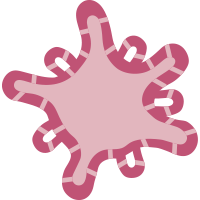
Organoid News
Organoid News is an online resource dedicated to the latest research about and featuring organoids.
Transcriptional Landscape and Chromatin Accessibility Reveal Key Regulators for Liver Regenerative Initiation and Organoid Formation
[Cell Reports] Comprehensive integration of RNA sequencing and ATAC sequencing revealed that ATF3 representing “Initiation_on” TF and ONECUT2 representing “Initiation_off” TF transiently modulate the occupancy of target promoters to license liver cells for regeneration.
ErbB2/HER2-Targeted CAR-NK Cells Eliminate Breast Cancer Cells in an Organoid Model That Recapitulates Tumor Progression
[Molecular Therapy] To evaluate activity of NK-92/5.28.z cells against ErbB2-positive breast cancer, researchers developed an organoid model derived from CKP mice that allowed conditional activation of oncogenic driver mutations.
hESCs-derived Organoids Achieve Liver Zonation Features through LSEC Modulation
[Advanced Science] The authors explored the feasibility of achieving zonated organoid by co-culturing hESCs derived hepatocytes with hESCs derived liver sinusoidal endothelial cells (LSECs) exhibiting characteristics of either the liver lobule's pericentral or periportal regions.
Tumor Organoid-Immune Co-Culture Models: Exploring a New Perspective of Tumor Immunity
[Cell Death Discovery] Investigators discuss the progress achieved in co-culturing tumor organoids with immune cells.
Human iPS Cell-Derived Respiratory Organoids As a Model for Respiratory Syncytial Virus Infection
[Life Science Alliance] The authors evaluated hiPSC-derived respiratory organoids, which contained respiratory epithelial cells, immune cells, fibroblasts, and vascular endothelial cells, for their potential to model respiratory syncytial virus infection and support pharmaceutical research.
Engineering Neuronal Networks in Granular Microgels to Innervate Bioprinted Cancer Organoids On-a-Chip
[Lab On A Chip] Researchers presented a versatile organ-on-a-chip platform designed to innervate organoids across diverse tissue types.
Impact of Enzymatic Isolation on the Propagation Efficiency of Patient-Derived Colorectal Cancer Organoids
[Scientific Reports] Researchers evaluated the role of enzymatic isolation in generating patient-derived organoids from colorectal cancer tissues by comparing four enzymatic methods: TrypLE, Trypsin–EDTA, Collagenase, and Hyaluronidase.
Neural Responses to Hypoxic Injury in a Vascularized Cerebral Organoid Model
[Neuroscience Bulletin] Scientists used vascularized cerebral organoids to investigate the hypoxic injury phenotype and explore the intercellular interactions between vascular and neural tissues under hypoxic conditions.
Modeling Heart Failure by Induced Pluripotent Stem Cell-Derived Organoids
[Biochimica Et Biophysica Acta-Molecular Basis of Disease] Investigators produced self-assembled, scaffold-free cardiac organoids from iPSCs, capable of simulating key aspects of heart failure in vitro.
Organoids in Dynamic Culture: Microfluidics and 3D Printing Technologies
[ACS Biomaterials Science & Engineering] Scientists provided a systematic overview of these emerging trends, discussing the strengths and limitations of these critical technologies, and offering insight and research directions for professionals working in the organoid field.
Spinal Cord Organoids from Human Amniotic Fluid iPSC Recapitulate the Diversity of Cell Phenotypes during Fetal Neural Tube Morphogenesis
[Molecular Neurobiology] Researchers used a variety of analyses, including immunofluorescent and single-cell transcriptomic approaches, to characterize spinal cord organoids from healthy and yelomeningocele fetuses.
Multi-Zonal Liver Organoids from Human Pluripotent Stem Cells
[Nature] To evaluate hepatic zonal polarity, investigators developed a self-assembling zone-specific liver organoid by co-culturing ascorbate- and bilirubin-enriched hepatic progenitors derived from hiPSCs.
Organoids are three-dimensional cell cultures that more accurately model cell behavior, organ function, and pathology than traditional two-dimensional cell culture. Organoid News was launched in 2020 to help scientists stay up-to-date with this revolutionary new research system. Use Organoid News to stay current with the latest applications and discoveries using organoids, as well as new reviews, jobs, news, and upcoming events.

 Cancer Stem Cell News
Cancer Stem Cell News Cell Therapy News
Cell Therapy News Dermal Cell News
Dermal Cell News Endothelial Cell News
Endothelial Cell News ESC & iPSC News
ESC & iPSC News Extracellular Matrix News
Extracellular Matrix News Hematopoiesis News
Hematopoiesis News Hepatic Cell News
Hepatic Cell News Human Immunology News
Human Immunology News Immune Regulation News
Immune Regulation News
 Intestinal Cell News
Intestinal Cell News Mammary Cell News
Mammary Cell News Mesenchymal Cell News
Mesenchymal Cell News Muscle Cell News
Muscle Cell News Neural Cell News
Neural Cell News Organoid News
Organoid News Pancreatic Cell News
Pancreatic Cell News Prostate Cell News
Prostate Cell News Pulmonary Cell News
Pulmonary Cell News
